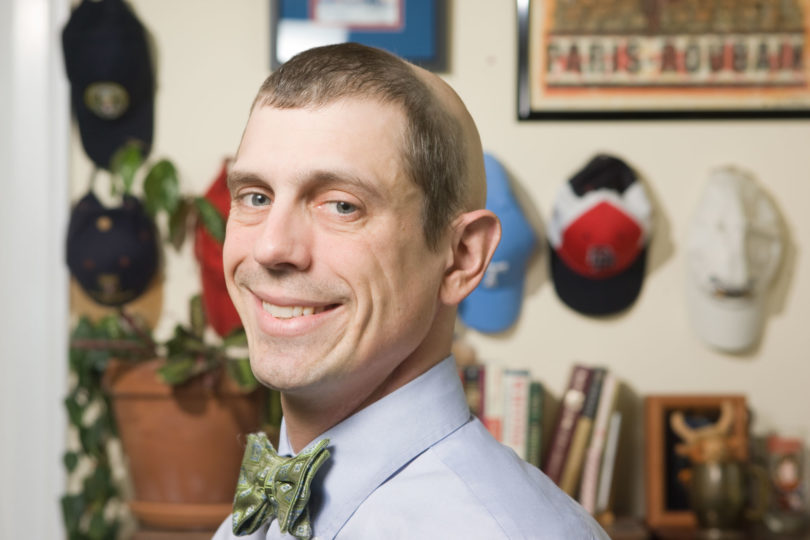At first glance Charlie Carabello looks like a typical UGA employee. He has on a UGA shirt and even a red-and-black bow tie.
If, however, he turns to the side, he shows a very pronounced indentation on the back of his head from a recent surgery. He also has what he calls his “rock-and-roll hairdo” from losing some of his hair from skin cancer treatment.
Carabello, associate director for enrollment management in the Office of Undergraduate Admissions, was diagnosed with stage three melanoma in October. He’s had surgery, radiation, medication and is currently giving himself shots several times a week in an effort to be cancer-free.
“I was lucky to catch it in time, and I was lucky to get into [The University of Texas] MD Anderson Cancer Center quickly because MD Anderson doesn’t take everybody all the time. I was also lucky enough to get a great doctor,” he said.
Melanoma is one of the rarer forms of skin cancer, but it’s also the deadliest.
“I don’t know if it’s from sun exposure,” he said. “I’ve never had my head burned, and I’ve always worn hats or helmets, but who knows.”
Carabello had an ordinary mole on the back of his head, but when it started to grow rapidly and change from a flat mole to a knob, his wife, Joanna, said it was time to go to the dermatologist.
Within five days of the diagnosis, he was on a plane to a world-class cancer facility in Houston.
He had surgery to remove as much of the cancer as possible. Doctors took out a nodule on the back of his head as well as 34 lymph nodes behind his left ear and down his neck and shoulder. While his head healed Carabello came back to Athens to get injections five times a week of high doses of interferon, a drug that helps reduce the risks of cancer recurrence. Next was very targeted radiation, and he’s now injecting himself in the stomach with a low dose of interferon three times a week.
“It’s not a lot of fun,” he said. “I would describe myself as an upbeat, energetic person and on the days after I’ve had my injection, I feel like I’ve been run over by a truck.”
Through out it all, he’s done his best to keep up with his work in the admissions office. When he was in Houston, he even answered e-mails while receiving radiation.
“I’ve been so healthy-except for the cancer,” he said.
At UGA since 2001, he had a lot of sick leave built up and so far, he hasn’t had to turn to shared leave-though co-workers have offered to donate hours to him.
“It’s nice that they have offered,” he said.
“Charlie is the guy in our office whom everyone loves and respects-he is young, energetic, good humored and hard-working,” said co-worker Patrick Winter, senior associate director in admissions.
So when co-workers heard of his diagnosis, they rallied and started a Relay for Life team called “Charlie’s Angels” in his honor.
The office has held fundraiser casual Fridays, potlucks, bake sales, cake auctions and even plant sales. They’ve raised around $6,000 so far and are in fourth place for Clarke County. The county’s Relay for Life was held May 14-15 at the Athens YMCA and as of press time the combined 79 teams had raised around $153,000.
Admissions office staff also donned yellow Livestrong wristbands for Carabello, who is an avid cyclist, while he was in Texas for treatment.
Now Carabello wears not only the yellow Livestrong wristband, which benefits the Lance Armstrong Foundation, but also a black wristband for melanoma awareness.
Carabello said that the support in the office has been wonderful and that the yellow wristbands are a nice daily reminder of the support he has received.
He’s also glad of any cancer awareness he can raise.
“I’ve had people here in the office tell me they’re going to the dermatologist-that’s awesome,” he said. “Getting your moles checked out is so important. Do it. It’s a simple thing to do. I would be kicking myself if I had blown it off.”
As of his last scans Carabello had a clean bill of health, with his next set of scans set for the end of June.
In cancer terms patients aren’t “cancer free” until after five years of clean scans. Until then, Carabello is wearing hats and applying SPF 100 sun block to the scar tissue on the incision site.
The cancer changed his outlook, he said.
“You can choose one of two paths: you can live with the constant fear of recurrence or you can live with the idea that every day is a gift,” he said. “For me, it’s helped me to appreciate the little things like watching my son, Adam, go through kindergarten. And every extra day that I get is a great day.”








